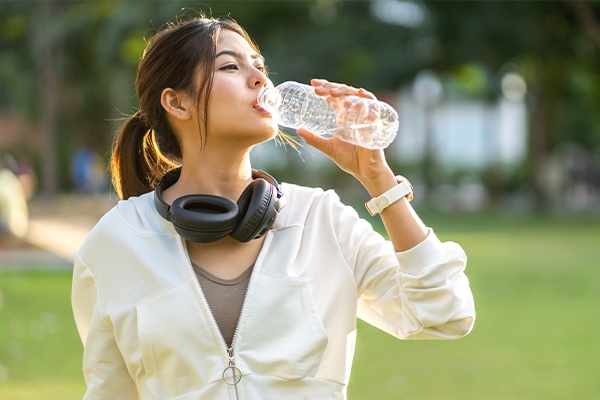8 Glasses of Water A Day. Really?

According to many sources, we should drink at least eight glasses of water per day to stay hydrated. Is it a myth or fact? Let's look into it!
Water is the body's main chemical component. Water is required for the proper functioning of every cell, tissue, and organ in the body. In reality, our body weight is made up of 50-70% water.
However, the body loses water through bowel movements, sweat, breath, and urine on a daily basis. To keep the body running properly, we must replenish our water supply by consuming liquids and meals that contain water.
What is the body's water need?
The suggestion to drink eight glasses of water per day makes sense and is simple to remember. Some people require fewer than eight glasses of water per day, while others require more.
In fact, everyone's water requirements differ. According to the National Academies of Sciences, Engineering, and Medicine in the United States, adult men should drink 3,7 liters of fluid per day, while adult women should drink 2,7 liters per day.
Drink more fluids to stay hydrated if you are outside on a hot day or doing something that causes sweating. The same is true if you are suffering from an illness that causes vomiting, diarrhea, or a fever.
Many factors, such as age, health, activity level, and environment, influence how much water we need to stay healthy and hydrated.
You can, however, check the color of your urine to ensure that you're getting enough water. If your urine is a pale yellow color, you are probably well hydrated. You should drink more water if your urine is dark in color.
What exactly is "water"?

Is drinking water the only way to stay hydrated? No! Water isn't the only thing that keeps our bodies hydrated. Every beverage helps to meet our daily fluid needs. All recommended fluid sources are included: plain water, various drinks, and food.
But be cautious. Some beverages have drawbacks. Juice, soda, and smoothies are a few examples. These drinks can hydrate you, but they are high in calories and sugar. The same rules apply to tea and coffee. Although both of these beverages contain water, the caffeine in them has a minor diuretic effect. Reduce your intake if these drinks make you jittery or anxious.
Remember that food provides a large portion of our water needs. We get 20% of our fluids from food on average. Fruits and vegetables, such as watermelon and spinach, contain nearly 100% water. These food groups contain a variety of vitamins and minerals that the body requires.
To prevent dehydration and ensure that the body is sufficiently hydrated, it is best to drink a glass of water
- after every meal and between meals;
- before, during, and after exercise;
- if you feel thirsty.
Benefits of a hydrated body

1. Improving brain function and increasing energy levels
Many people believe that being dehydrated throughout the day lowers energy levels and brain function. According to one study, women who lost 1.36% of their fluids due to exercise experienced mood changes and an increase in headache frequency.
The National Headache Foundation (NHF) states that headaches are a sign of mild to moderate dehydration, including migraines! NHF recommends drinking water only when experiencing a headache. Avoid isotonic drinks as they worsen dehydration.
2. Reducing hunger and assisting in weight loss
Many people believe that drinking plenty of water will boost their metabolism and reduce their appetite.
Drinking water half an hour before a meal can help you consume fewer calories. This is possible because the body can easily confuse thirst for hunger. Drinking before a meal can help with weight management in general, especially when combined with a healthy eating pattern.
3. Reducing constipation, urinary tract infections, and hydrating skin
Drinking more water and staying hydrated can help with constipation, bladder and urinary tract infections (UTIs), kidney stones, and dehydrated skin.
Constipation is frequently caused by a lack of fluids and a diet high in fiber. Make drinking plenty of water a habit throughout the day. You may find yourself going to the restroom more frequently after increasing your intake.
UTIs are usual when bacteria enter the urinary tract. Water helps flush bacteria out of the bladder, preventing infections. If water intake is insufficient, the body will send a warning signal, such as dark-colored urine or decreased urine output.
Dehydration can cause dry skin that does not improve even after applying lotion. Increase your daily water intake to restore skin radiance.
Maintaining a water balance is critical for survival. The body has an advanced system that regulates when and how much water we need to drink. When the body's water content decreases, it causes thirst.
This mechanism is analogous to breathing. We don't need to consider it. The body understands how to balance water levels and when it requires more.
If you have a medical condition, such as heart failure or certain kidney diseases, you may need to limit your fluid intake or consult a doctor to get the proper dose.



